GULLS
Also see :
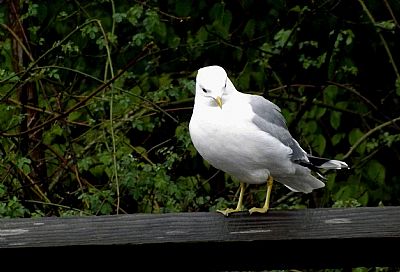
- BLACK HEADED GULL summer and winter
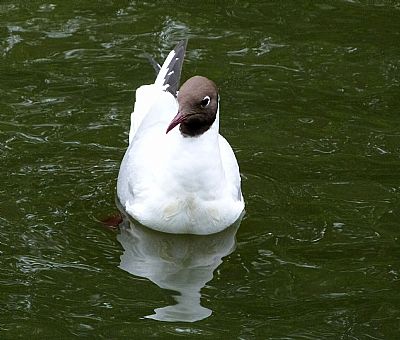
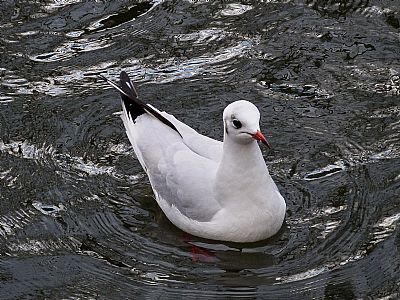
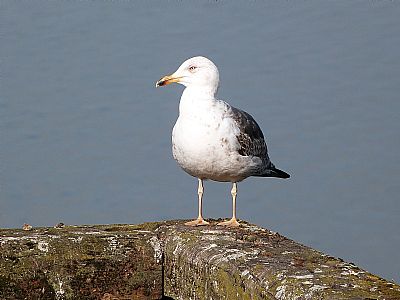
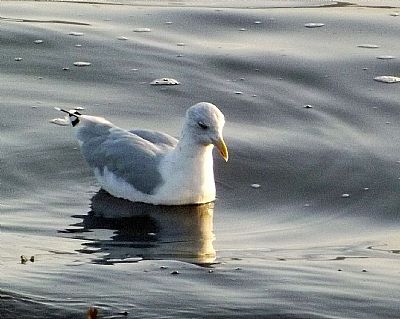
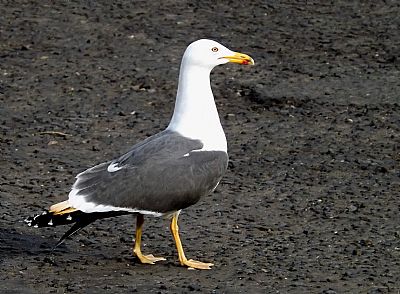
West Dunbartonshire may not have much of a shoreline that be cosnidered "sea". What it has is a short stretch of the Firth of Clyde right where that becomes the River Clyde. But we do still manage to have a good variety of seabirds. Many birds, such as gulls, may be thought of as seabirds, but they are not so semantically precise and so many will set up home right in our town centres or feed in farm fields.
If someone exclaims "what is a seagull doing inland?", you can respond with "a gull's a gull for a'that". We tend to over label many of them as "seabulls" when in fact many are quite happy almost anywhere. It is more proper to simply call them gulls.
And it is this adaptability that leads to trouble between us and them.
While it is qutie entertaining to feed gulls and similar birds along our quayside such as the River Leven in Dumbarton, the bolder they become, the more problematic. Not only do they foul our buildings (wonder where that word comes from?), they can become quite vicious in the way they dive down on us both to snatch food (even if not intended as a hand-out) or to defend their young when nesting.
IDENTIFYING YOUNG GULLS
Usually this is as easy as noting the adult attending to them, but it can get confusing when the juvenile has wandered off and gulls of other species are becoming irritated too.
So often an immature, but an almost fully grown gull finds itself a little battered on the ground and wanders around eliciting sympathy and sometimes disgust from passers by. It would be so much better if they lived and bred in natural environments such as Dumbarton Rock. Quite what to do about them can be a dilemma. They don't always heal from their falls and may not survive. Nature has a way of dealing with them that may upset us, but rescuing them is rarely a satisfactory answer.
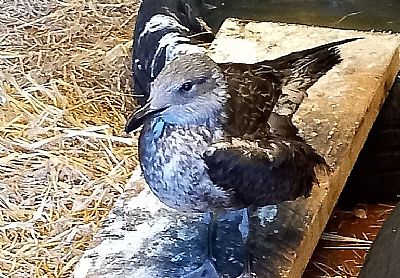
This immature, but almost fully grown gull, most likely a lesser black-backed gull has been rescued. It has a damaged wing and now dependent on human care doesn't have a natural nor bright future.
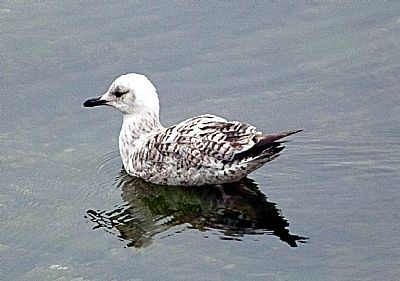
You can see some subtle differences between this one and that above. This appears to be a young common gull, but can we be sure? [Rothesay June].
The younger they are the more simple you would suppose to identify them - just see which nest they are from and which adults are in attendance.
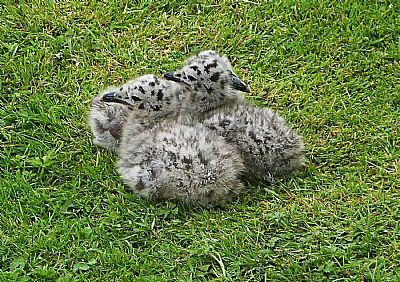
This cute huddle of gull chicks is thought to be that of herring gulls as there was an adult one close by. But there were also many common gulls nesting and circling around the same area [Rothesay Castle].
WHAT GULLS EAT
We all know that gulls are opportunitic eaters, even swooping down on us humans to steal food from our hands. And we know that they may scavenge the remains of dead birds, fish or other creatures. It is very possible that the adult gull lingering close to these babies in the photo above, was not a parent, but one tempted to lunge at them in order to eat them. They were huddled close together, not only for warmth, but for mutual security. Gulls can be cannibalistic.
Normally gulls will eat pretty much anything edible that they can scavange. They will hunt fish, insects, rabbits, rats, reptiles, and amphibians on their own. This may seem disgusting to us humans, but they are the cleaners of the natural environment. The trouble is that we humans also produce so much of the rubbish that they go after. That includes the packaging!
Gulls are very adaptive and their range of diet includes everything from the chicks of other gulls to chips and ice cream. Even moles and the milk from a mother seal!. [See Gulls Eating Stuff website below].
Seagulls are birds dedicated to caring for their young, and both parents are actively involved in incubating, caring for, and raising the chicks. They form long-lasting couples, even for life.
When baby seagulls are born, they are entirely dependent on their parents for food. The parents bring small fish, larvae, or insects as their primary source of nourishment. It is common for the parent to consume the food first and then regurgitate it to make it easier for the chicks to feed. [Animal Wised].
Naturally, "seabirds" include quite a few other bird species too such as comorants (which we describe in their own section) and many waders. Even, as is common locally, swans.
ANIMAL WISED : https://www.animalwised.com/what-do-seagulls-eat-4720.html
BBC on unusual feeding : https://www.bbc.co.uk/news/articles/c2erkry8jn8o
GULLS EATING STUFF website : https://citsci.org/projects/gulls-eating-stuff/forum
RSPB : https://www.rspb.org.uk/birds-and-wildlife/wildlife-guides/bird-a-z/great-black-backed-gull/
WEST DUNBARTONSHIRE COUNCIL : Gull advice : https://www.west-dunbarton.gov.uk/public-health-protection/gull-advice/#:~:text=Lesser%20Black%20Backed%20and%20Herring%20Gulls%20are%20common,within%20the%20area%20rather%20than%20on%20coastal%20cliffs.
WILDLIFE TRUSTS : https://www.wildlifetrusts.org/how-identify/identify-gulls

